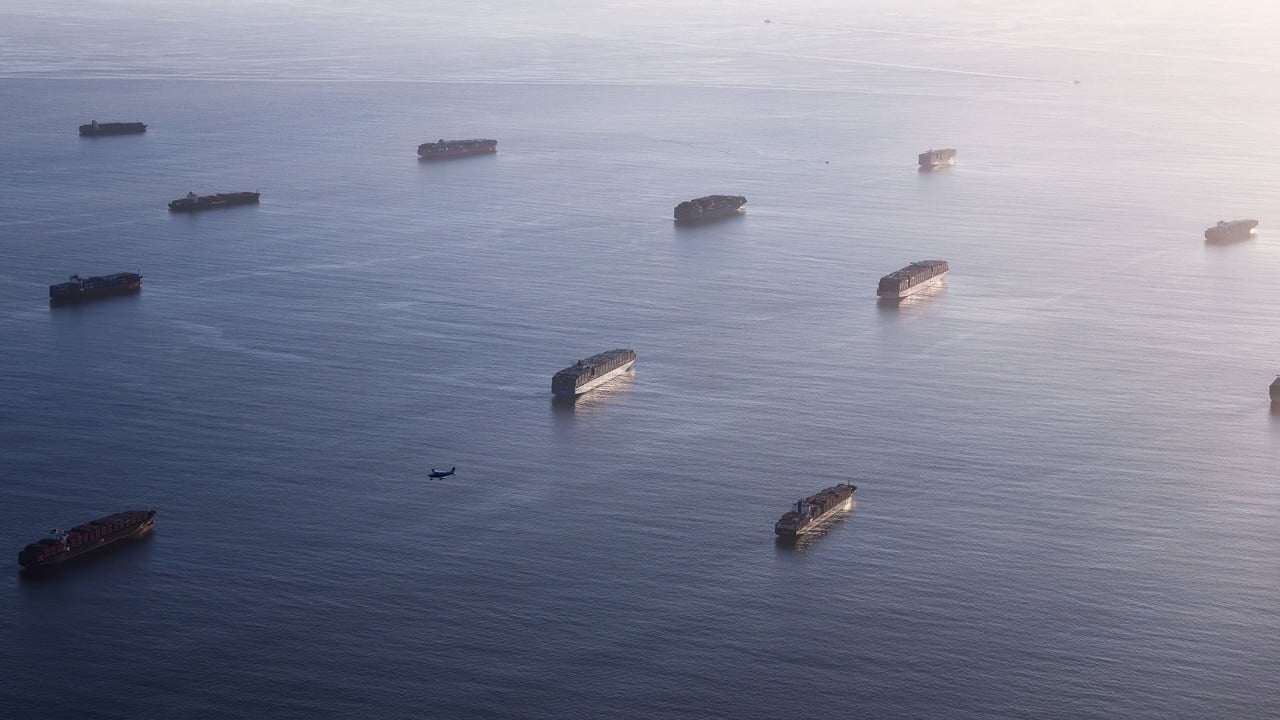
China’s coronavirus quarantine threatens supply chains as ‘vulnerable’ seamen forced to endure weeks of isolation
- Beijing’s harsh quarantine measures are forcing hundreds of thousands of Chinese seafarers to endure weeks of isolation before they can go home
- As seamen look to return for the Lunar New Year holiday, the strict rules are threatening to cause supply chain disruptions in the Pearl River Delta
Spending months at sea is part of the job for Chinese crewmen like Geng, but as the coronavirus pandemic drastically alters the way people move around the world, the stretches away from home are getting longer and longer.
After finishing a seven-month contract in late October and disembarking at the Egyptian seaport of Suez, Geng, who only gave his surname, is still in quarantine one and a half months later.
“Two more weeks to go,” he said recently from his third and final hotel room stay in his hometown in Hebei province.
Some 800km away in Shenyang, a city in northeastern China, second mate Hu Cheng has also just started another stint of hotel quarantine after two weeks stuck in Tianjin, where he got off a bulk carrier shuttling across Asia, after nearly eight months at sea. He is looking forward to leaving the hotel, but knows he too has another week’s home isolation to follow.
And as most Chinese seamen look to reunite with their families for the Lunar New Year, which falls on February 1, the strict quarantine measures are threatening more disruptions to supply chains, especially for raw materials destined for Hong Kong, according to industry insiders.
Because Chinese crew have to factor in weeks of quarantine before they can see loved ones, many shipping companies based in southern China – including Hong Kong – are extending service suspensions by at least six weeks ahead of the holiday, from late December to mid February next year.
For vessels with an international crew, the Lunar New Year does not pose a big problem. Even if most Chinese seamen go home, they can be replaced with others from Southeast Asia.
But for ships with all Chinese crew, like those plying the waters of the Pearl River Delta – home to some of the busiest ports in the world – the impact on supply chains could be severe.
Construction materials, such as aggregate, natural sand and cement, will be among the products facing the biggest shortages in Hong Kong, according to Ambrose Linn, chief executive of Hong Kong Construction Materials Association.
The materials are carried by barges – flat-bottomed boats with an average capacity of 5,000 tonnes – that travel back and forth between Hong Kong and small ports in Guangdong province.
“In Hong Kong, the annual consumption of aggregate is 10 million tonnes, and 90 per cent is imported from Guangdong province,” Linn said, adding it was too heavy to be transported by truck.
Under new regulations, companies will need to pay salaries to crew in quarantine starting from January 1.
According to Lin, the supply of construction materials for Hong Kong will be disrupted for at least one and a half months due to the service suspensions.
If the projects are delayed, the labourers will be affected, because they are paid on a job basis.
“If we don’t have enough rocks and aggregate, we won’t have enough concrete,” he said.
“If we don’t have enough concrete, a lot of projects, including public and private ones, have to be suspended or delayed substantially.
“If the projects are delayed, the labourers will be affected, because they are paid on a job basis. If you don’t have any jobs for them, it means their earnings will be affected, and their livelihoods.”
Crew members of international vessels must quarantine for at least 14 days after they disembark at Chinese ports, and sometimes up to three weeks in northern China.
Once they finish and head home, many local governments – especially in northern provinces where rules are stricter – require further isolation for up to 21 days.
Geng still considers himself lucky because he managed to disembark in Egypt, then return for quarantine in his hometown. Others have been stuck with different fates.
In the past two years, some boats have been refused the right to dock at all because crew were infected with the virus. Even for healthy people, disembarking on time can be a luxury.
Some foreign ports – including many in Europe, where seafarers are granted visas for just a few days – do not have the conditions that allow Chinese crew to disembark and quarantine for at least two weeks.
A colleague of mine has been stuck in Bangladesh for three months and still has not yet got home
If a seafarer does successfully disembark at a foreign port, a flight home may be unavailable, as the Chinese government has imposed “circuit breaker measures” for inbound international flights – a flight will be suspended if too many passengers from the country test positive for the virus.
“A colleague of mine has been stuck in Bangladesh for three months and still has not yet got home,” Geng said.
Authorities have demanded all Chinese ports allow crew to disembark, but some private ports still refuse to do so, seafarers said.
Shipping companies may also delay shift changing due to the cost. China Crew’s Remuneration index, which reflects the salary of seamen, has increased 27 per cent since the beginning of the year.
Paying for airline tickets and quarantine for the old crew, plus higher salaries for the new one is unpalatable for many firms, they said.
“Facing shipping companies, crew members are a very vulnerable group of people,” said Hu, the other seafarer.
In mid-December, Li Hongyin, deputy director general of the China Maritime Safety Administration, said the agency was working to make changing shifts easier for seamen and to provide them with medical help, according to the People’s Daily.
“Since the pandemic began, their working and living environments have undergone great changes, and they have made tremendous efforts and sacrifices for this,” Li was reported as saying.
Despite its key position in global shipping as the world’s top exporter, China seems determined to hang onto its zero-Covid policy.
The government has, however, acknowledged the difficulties faced by seafarers and is stepping up support.
The National Health Commission last Friday issued a notice calling on local authorities to better coordinate resources for sea crew going into quarantine to guarantee their “safe and smooth return to the country”.
In the meantime, Hong Kong’s construction industry is bracing for shortages in cement, aggregate, steel, river sand and manufactured sand.
“We have been stockpiling aggregate since mid-December, but it will never be enough,” Linn said. “It will only help relieve the situation very slightly.”



